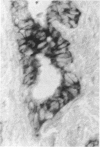Abstract
Recently carcinoembryonic antigen (CEA) has been functionally identified in vitro as a cell adhesion protein. Identification of its function in vivo requires knowing how CEA mRNA is transcribed in intact tissues. For this purpose, 16 cases of colon adenocarcinomas and autologous normal colon were studied by quantitative in situ hybridization for the expression of CEA mRNA. Normal colonic crypts displayed an upward gradient of mRNA expression. In colon carcinoma, tumor cells at the deep invading front of the tumor contain 2.6 times more CEA mRNA than tumor cells near the luminal surface. Immunoelectron microscopy showed intercellular CEA. In normal colon and colonic carcinoma, changes in CEA mRNA were paralleled by similar gradients in CEA protein, consistent with a transcriptional regulation of CEA expression. A new in vivo model of CEA function is presented to account for this overexpression of CEA occurring at sites characterized by changes in cell adhesion. The model requires that secreted CEA inhibits cell adhesion mediated by cell-bound CEA.
Full text
PDF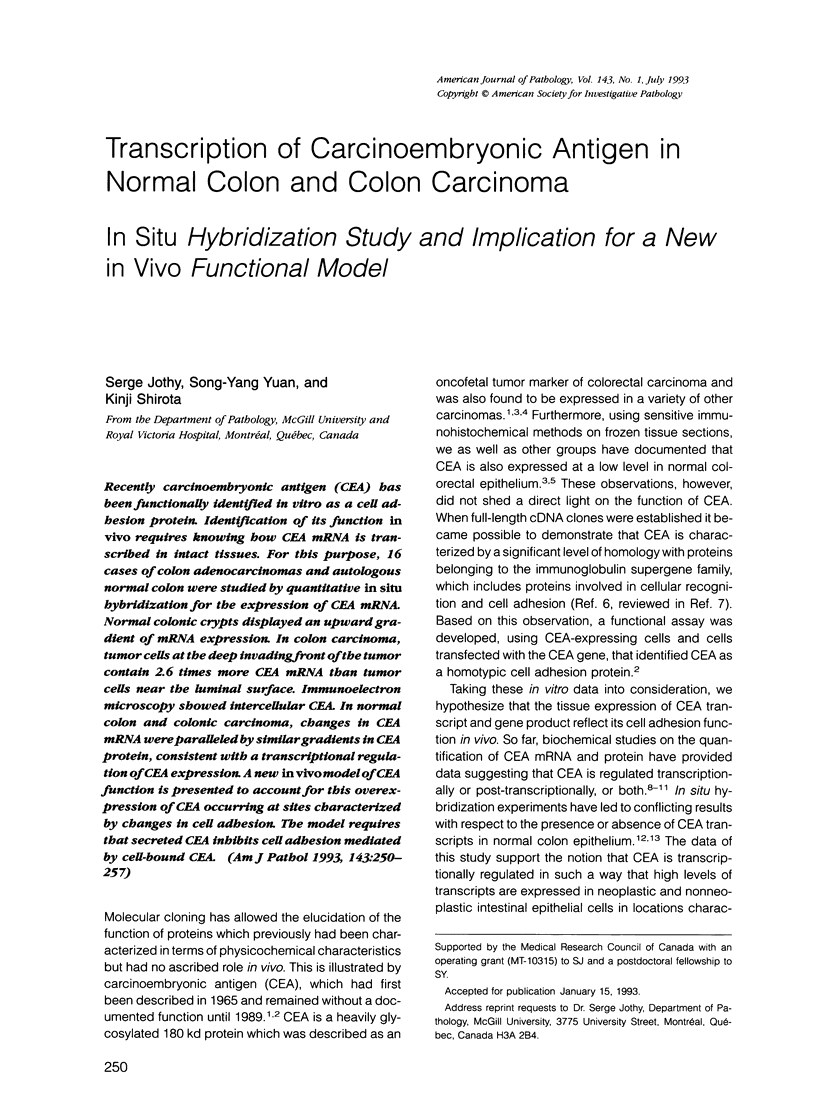
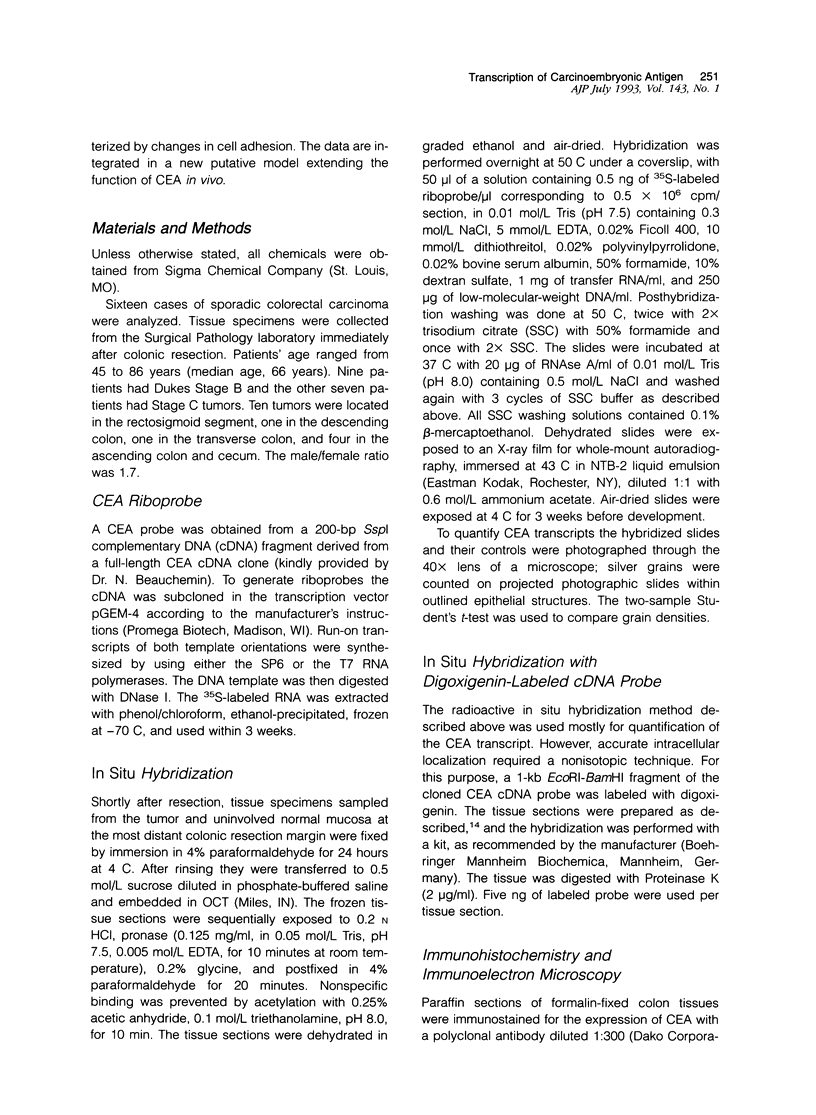
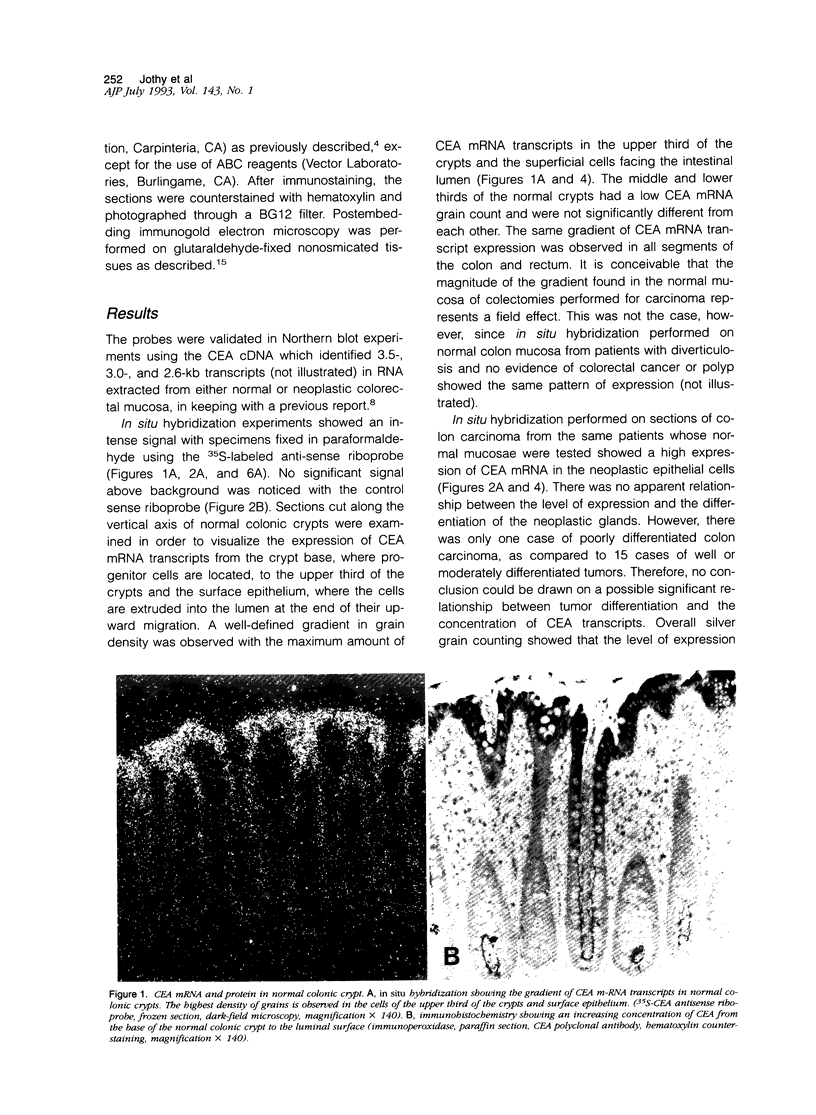
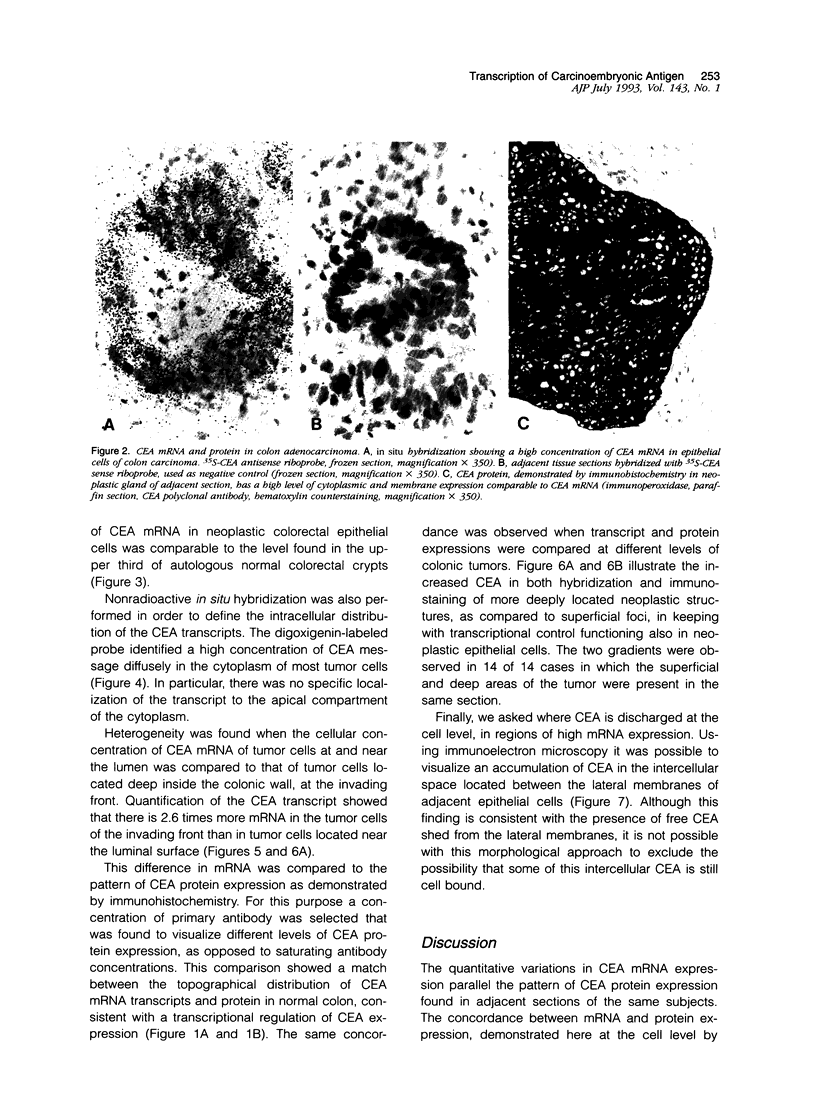
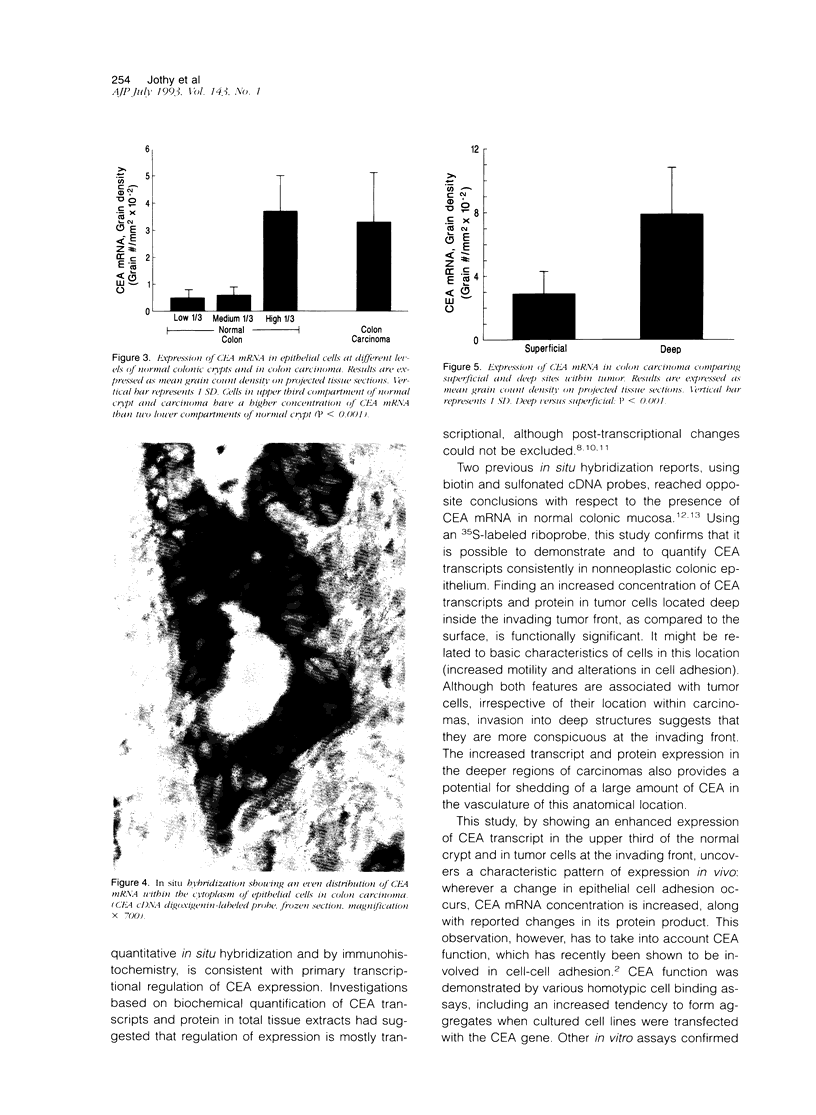
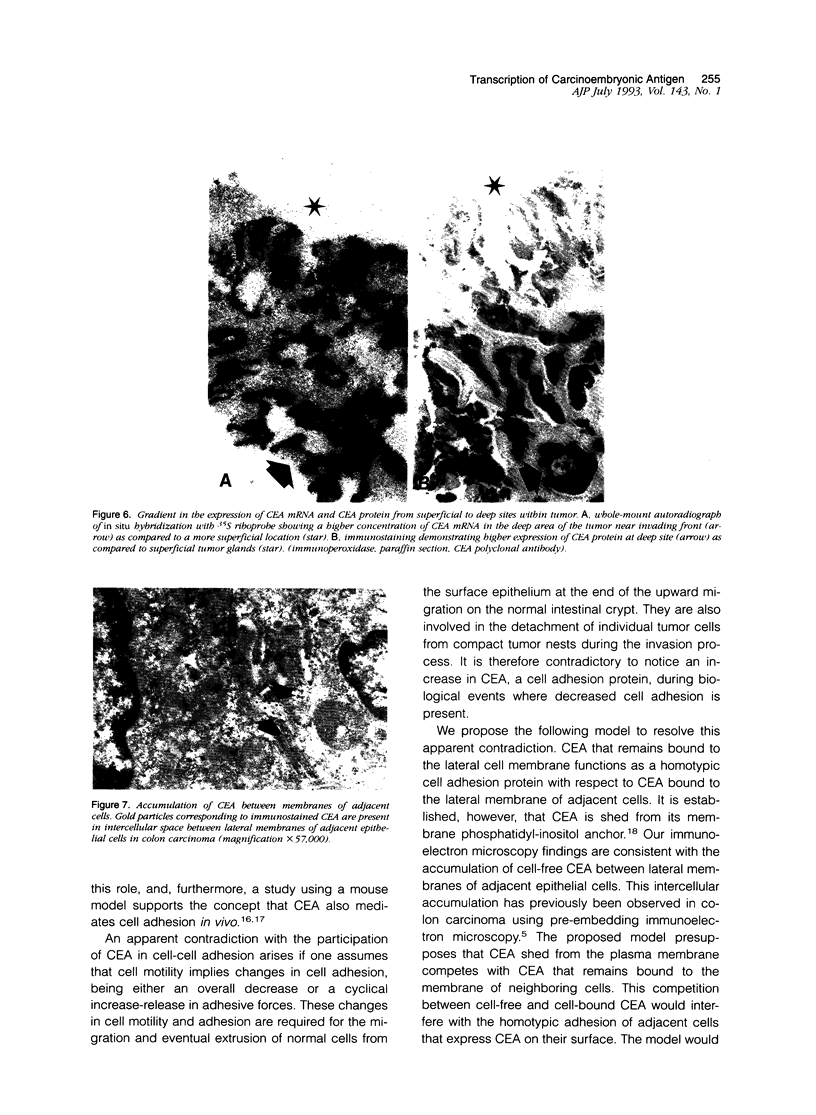
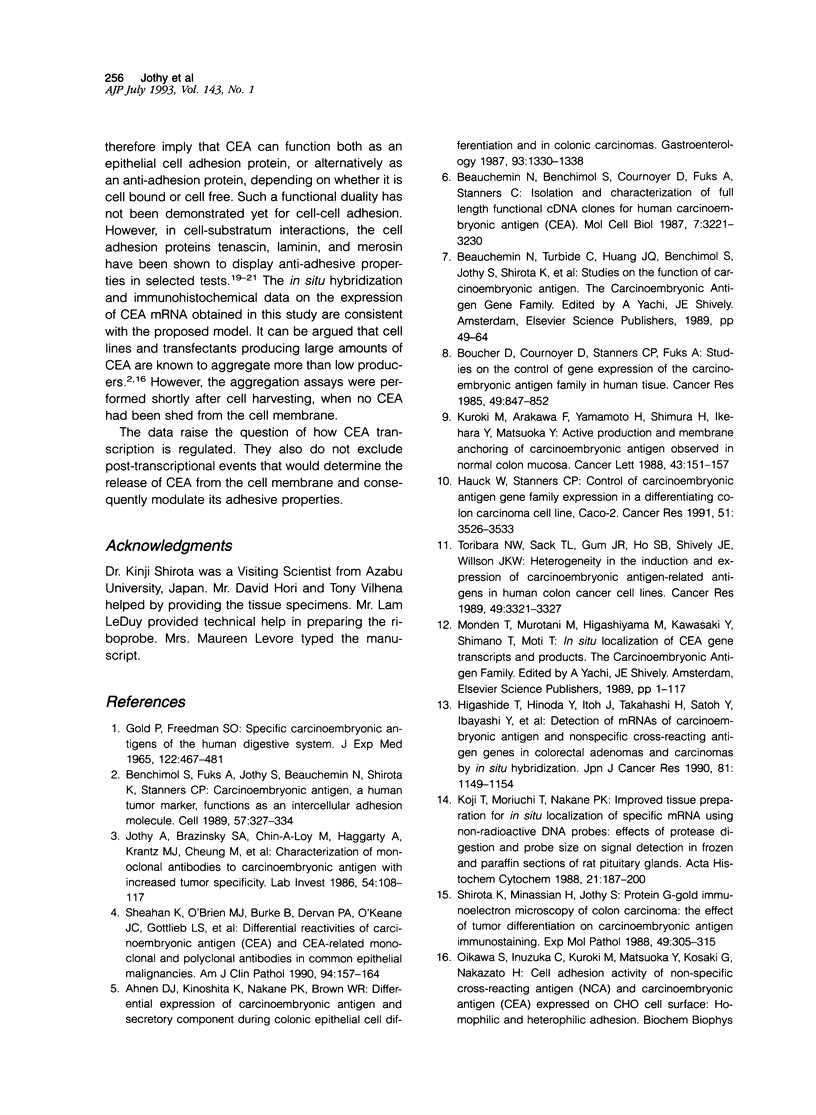

Images in this article
Selected References
These references are in PubMed. This may not be the complete list of references from this article.
- Ahnen D. J., Kinoshita K., Nakane P. K., Brown W. R. Differential expression carcinoembryonic antigen and secretory component during colonic epithelial cell differentiation and in colonic carcinomas. Gastroenterology. 1987 Dec;93(6):1330–1338. doi: 10.1016/0016-5085(87)90263-0. [DOI] [PubMed] [Google Scholar]
- Beauchemin N., Benchimol S., Cournoyer D., Fuks A., Stanners C. P. Isolation and characterization of full-length functional cDNA clones for human carcinoembryonic antigen. Mol Cell Biol. 1987 Sep;7(9):3221–3230. doi: 10.1128/mcb.7.9.3221. [DOI] [PMC free article] [PubMed] [Google Scholar]
- Benchimol S., Fuks A., Jothy S., Beauchemin N., Shirota K., Stanners C. P. Carcinoembryonic antigen, a human tumor marker, functions as an intercellular adhesion molecule. Cell. 1989 Apr 21;57(2):327–334. doi: 10.1016/0092-8674(89)90970-7. [DOI] [PubMed] [Google Scholar]
- Boucher D., Cournoyer D., Stanners C. P., Fuks A. Studies on the control of gene expression of the carcinoembryonic antigen family in human tissue. Cancer Res. 1989 Feb 15;49(4):847–852. [PubMed] [Google Scholar]
- Calof A. L., Lander A. D. Relationship between neuronal migration and cell-substratum adhesion: laminin and merosin promote olfactory neuronal migration but are anti-adhesive. J Cell Biol. 1991 Nov;115(3):779–794. doi: 10.1083/jcb.115.3.779. [DOI] [PMC free article] [PubMed] [Google Scholar]
- Chiquet-Ehrismann R., Kalla P., Pearson C. A., Beck K., Chiquet M. Tenascin interferes with fibronectin action. Cell. 1988 May 6;53(3):383–390. doi: 10.1016/0092-8674(88)90158-4. [DOI] [PubMed] [Google Scholar]
- Gold P., Freedman S. O. Specific carcinoembryonic antigens of the human digestive system. J Exp Med. 1965 Sep 1;122(3):467–481. doi: 10.1084/jem.122.3.467. [DOI] [PMC free article] [PubMed] [Google Scholar]
- Hauck W., Stanners C. P. Control of carcinoembryonic antigen gene family expression in a differentiating colon carcinoma cell line, Caco-2. Cancer Res. 1991 Jul 1;51(13):3526–3533. [PubMed] [Google Scholar]
- Higashide T., Hinoda Y., Itoh J., Takahashi H., Satoh Y., Ibayashi Y., Imai K., Yachi A. Detection of mRNAs of carcinoembryonic antigen and nonspecific cross-reacting antigen genes in colorectal adenomas and carcinomas by in situ hybridization. Jpn J Cancer Res. 1990 Nov;81(11):1149–1154. doi: 10.1111/j.1349-7006.1990.tb02527.x. [DOI] [PMC free article] [PubMed] [Google Scholar]
- Hostetter R. B., Augustus L. B., Mankarious R., Chi K. F., Fan D., Toth C., Thomas P., Jessup J. M. Carcinoembryonic antigen as a selective enhancer of colorectal cancer metastasis. J Natl Cancer Inst. 1990 Mar 7;82(5):380–385. doi: 10.1093/jnci/82.5.380. [DOI] [PubMed] [Google Scholar]
- Jothy S., Brazinsky S. A., Chin-A-Loy M., Haggarty A., Krantz M. J., Cheung M., Fuks A. Characterization of monoclonal antibodies to carcinoembryonic antigen with increased tumor specificity. Lab Invest. 1986 Jan;54(1):108–117. [PubMed] [Google Scholar]
- Kuroki M., Arakawa F., Yamamoto H., Shimura H., Ikehara Y., Matsuoka Y. Active production and membrane anchoring of carcinoembryonic antigen observed in normal colon mucosa. Cancer Lett. 1988 Dec 1;43(1-2):151–157. doi: 10.1016/0304-3835(88)90228-5. [DOI] [PubMed] [Google Scholar]
- Sheahan K., O'Brien M. J., Burke B., Dervan P. A., O'Keane J. C., Gottlieb L. S., Zamcheck N. Differential reactivities of carcinoembryonic antigen (CEA) and CEA-related monoclonal and polyclonal antibodies in common epithelial malignancies. Am J Clin Pathol. 1990 Aug;94(2):157–164. doi: 10.1093/ajcp/94.2.157. [DOI] [PubMed] [Google Scholar]
- Shirota K., Minassian H., Jothy S. Protein G-gold immunoelectron microscopy of colon carcinoma: the effect of tumor differentiation on carcinoembryonic antigen immunostaining. Exp Mol Pathol. 1988 Dec;49(3):305–315. doi: 10.1016/0014-4800(88)90003-2. [DOI] [PubMed] [Google Scholar]
- Spring J., Beck K., Chiquet-Ehrismann R. Two contrary functions of tenascin: dissection of the active sites by recombinant tenascin fragments. Cell. 1989 Oct 20;59(2):325–334. doi: 10.1016/0092-8674(89)90294-8. [DOI] [PubMed] [Google Scholar]
- Takami N., Misumi Y., Kuroki M., Matsuoka Y., Ikehara Y. Evidence for carboxyl-terminal processing and glycolipid-anchoring of human carcinoembryonic antigen. J Biol Chem. 1988 Sep 5;263(25):12716–12720. [PubMed] [Google Scholar]
- Toribara N. W., Sack T. L., Gum J. R., Ho S. B., Shively J. E., Willson J. K., Kim Y. S. Heterogeneity in the induction and expression of carcinoembryonic antigen-related antigens in human colon cancer cell lines. Cancer Res. 1989 Jun 15;49(12):3321–3327. [PubMed] [Google Scholar]





